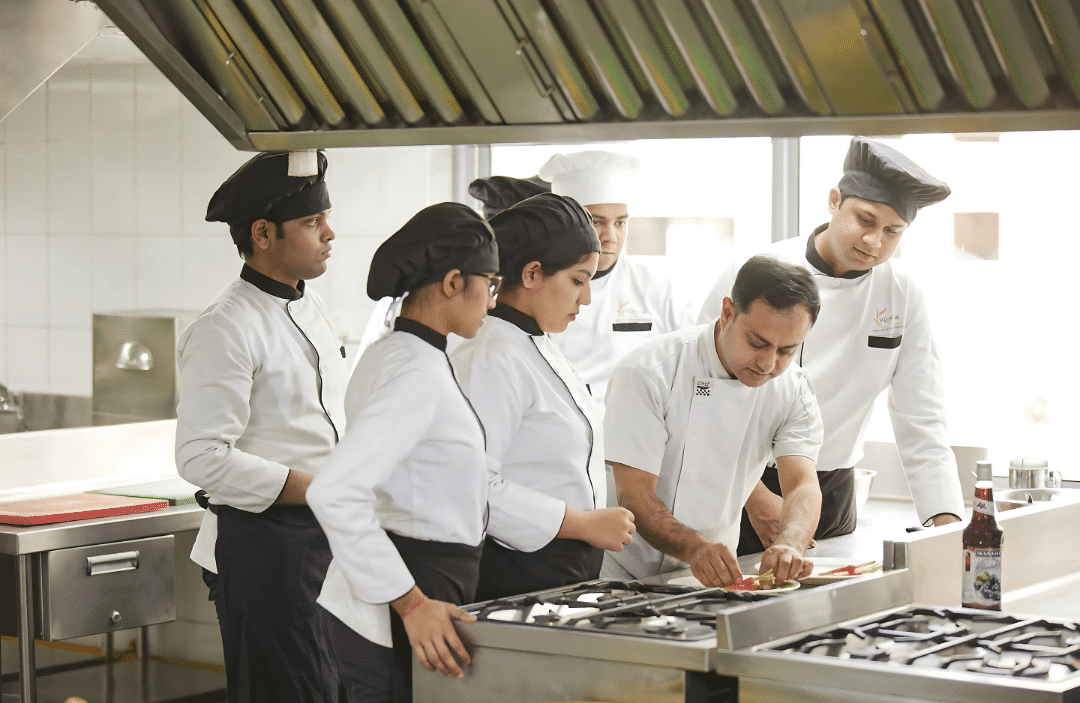
Home » About Vedatya » News & Media » Indian roots and global techniques: Training budding chefs to lead in global culinary tourism


The culinary landscape is transforming at an unprecedented pace. In 2023, the global culinary tourism market size was estimated at 11.5 billion USD, which is now projected to reach 40.53 billion USD by 2030, growing at a CAGR of 19.9%. It gives tremendous opportunities to all the stakeholders in the business; however, the success of culinary tourism would depend on the optimum utilisation of the opportunity, while the tourism industry is playing its part, chefs are increasingly becoming the growth engine of the tourism industry.
With time and the influence of social media, cuisines have crossed borders; chefs have become culture ambassadors, sustainability advocates, and innovators rolled into one. In this fast-moving ecosystem, the ability to combine global techniques with local roots is becoming a defining skill for success.
For the new generation of Indian chefs, this means learning to master sous vide and fermentation while respecting the legacy of mustard oil, millets, and traditional spice blends. It’s no longer a question of choosing between tradition and modernity, but one has to look for ways and means to harmonise the two. This evolving culinary reality calls for a new kind of training, one that nurtures both international expertise and indigenous understanding. Here’s how forward-looking institutions are enabling potential chefs.
With the explosion of international travel, global food shows, and social media, diners are more aware of global food trends than ever, be it molecular gastronomy, sustainable plating, fermentation, or zero-waste kitchens. A chef today is not just expected to cook but also to innovate, narrate, and inspire through food.
But in this race to be an international chef, many young professionals risk disconnecting from their cultural context and authenticity gets diluted, and what could have been a powerful narrative of identity becomes just another trend-based dish. This is why training the next generation of culinary professionals requires more than just teaching knife skills or baking ratios. It demands an education model that nurtures curiosity, cultural grounding, and creativity, all at once.
Progressive culinary institutions across India are reimagining how chefs are trained; students are no longer confined to textbooks and theory. The classroom is a training kitchen, a live farm, or even a restaurant simulation lab where students serve real diners and manage real-time kitchen operations. This approach does not just teach, but it transforms.
Applied Learning with Global Tools – Future chefs are trained using international culinary methods, French sauces, Japanese precision, and Mediterranean style plating, but they learn to apply them with local ingredients. Instead of imported sea bass, they are experimenting with betki. Instead of relying on foreign condiments, they’re elevating jackfruit, tamarind, and kokum with fine-dining techniques. This dual exposure ensures that students can speak the global language of technique while telling the Indian story of ingredients, culture and tradition.
From Soil to Service: Experiencing the Full Cycle – Several programs incorporate organic farming, poultry management, and herb gardens into their curriculum. This on-ground exposure deepens the students’ respect for provenance and sustainability. When a chef knows how turmeric grows or what season yields the best mustard greens, their understanding of food becomes rooted and intuitive. It’s not just about cooking; it’s about connecting with the land, and by extension, with cultural identity.
Sustainability Meets Legacy – There is a growing awareness among young chefs to be mindful of food waste, environmental impact, and ethical sourcing. But sustainable practices in India have existed for centuries, be it banana-leaf serving, whole-vegetable cooking, or fermentation for preservation. The challenge and opportunity are to reintroduce these traditions using global frameworks. Imagine a zero-waste tasting menu that celebrates millets and pickles or a vegan course that draws from temple cuisine but is plated like it belongs in Copenhagen. That is where innovation truly meets identity.
International Exposure, Local Reinvention – What sets great culinary training apart is not just offering study-abroad programs or international chef masterclasses, but helping students contextualise what they learn. A technique seen in Italy might find a new home in India when applied to regional cheeses or forgotten grains. Internships at global hotel chains, cruise liners, or gourmet restaurants allow students to refine their skills, but their real success lies in how they return and reapply these learnings to elevate Indian cuisine with intention.
Confidence in Storytelling – Modern chefs are also storytellers. They must present their plates with not just taste but thought. A training model that encourages experimentation, entrepreneurship, and research projects equips students with the confidence to own their narrative. Whether they are opening a cloud kitchen, launching a food blog, or competing on international stages, chefs who know their roots can tell richer stories, and that is what resonates globally.
India has always had a deep culinary legacy. From royal kitchens to community feasts, from Ayurveda to street food, our traditions are vast, diverse, and powerful. The future of Indian cuisine does not lie in mimicking Western techniques, but in integrating them thoughtfully to let our ingredients, history, and flavours shine. The best chefs of tomorrow will be those who can travel the world through food but come home with every dish. They will innovate boldly, plate beautifully, and cook consciously, and they will do it not just with technique, but with pride in their roots.
Recent Comments